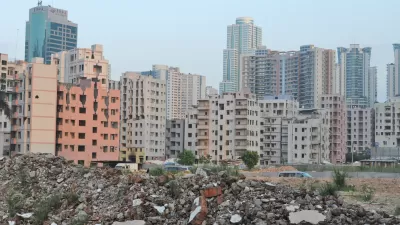Technology
Mexico City's New Smog-Eating Building
A new building at a Mexico City hospital has been screened with an advanced, and quite attractive, tile that breaks down the harmful pollutants in smog into less toxic substances, reports Zak Stone.
Big Data Brings Big Benefits to Bloomberg's New York
Alan Feuer profiles the work of New York City's Office of Policy and Strategic Planning, a "geek squad of civic-minded number-crunchers" turning the city's trove of digital data into actionable information.
How Well Has L.A. Lived up to 25-Year-Old Predictions?
How well could today's futurists predict how everyday life will change by 2038? This was the task that the Los Angeles Times Magazine embarked on in 1988. A class of graduate students at USC has been looking into which predictions came true.
Strong Government Regulations Key to Kicking Oil Habit, Reducing Vehicle Emissions
What will it take to greatly reduce oil consumption and greenhouse gas emissions from passenger vehicles? Efficiency, alternative fuels, and strong governmental policies reports the National Research Council. And it will be highly unlikely.

Chinese Skyscrapers in Danger of Collapse
A growing "sand scandal" in Shenzhen may just be the tip of the iceberg when it comes to the quality of concrete used in constructing China's skyscrapers. The construction of what was to have become the country's tallest building has been halted.
NYC Subway Stations to Deploy Giant iPads
Mark Wilson looks at the NY MTA's plan to install 90 touch-screen kiosks at subway stations around the city beginning this year. The innovative kiosks will offer rider information, interactive maps, and will even be able to run third-party apps.

Top Trends 2012-2013
Over the course of the year, the editors of Planetizen review and summarize thousands of articles, books, studies and editorials related to planning and urban development. Here are our picks for the most notable planning trends of the past year.
Felling Opposition to Wooden Skyscrapers
For a number of reasons, the use of wood for the construction of large buildings fell out of favor more than a century ago. So why is one Vancouver-based architect arguing for constructing high-rises using one of nature's oldest building materials?
Obama Pushes to Fund Advanced Autos with Fossil Fuel Revenues
At a visit to the Argonne National Laboratory today, President Obama was expected to unveil his plan to spend $2 billion in oil and gas revenues "to find ways to replace hydrocarbons as the primary fuel for the nation’s cars, trucks and buses."
Spanish City Offers Glimpse Into a Smart Future
While experts opine on what the city of the future will look like, Santander "has surged to the forefront of those aspiring to be smart." With 10,000 sensors collecting data and a custom app serving residents, the city is showing how smart is done.
Japanese Breakthrough Could Revolutionize Natural Gas Extraction
Japan is looking to unleash a new source of natural gas in the same way that fracking and horizontal drilling has revolutionized natural gas drilling in the U.S. It's called methane hydrate or 'flammable ice', and is the most prevalent energy source.
Are Cars Destined to Share the Fate of the Steamship and the Landline?
We're likely witnessing the beginning of the slow decline of a technology that's defined our transportation and land use policies for a century - the private car. Emily Badger explains how unnoticed events produce socio-technical transitions.
Urban Innovation Award Winners Announced
Providence, Rhode Island's vision for improving early childhood literacy has been selected as the winner of the Bloomberg Philanthropies' Mayor's Challenge, a nationwide contest seeking innovative and replicable ideas for improving cities.
Modern Technology Helps Complete a Building Designed 130 Years Ahead of its Time
Still under construction 130 years after it was designed by architect Antoni Gaudi, the Sagrada Familia is the longest running architectural project in the world. On Sunday, "60 Minutes" looked at how modern technology is aiding its completion.
Prominent Urbanists Face Off in SimCity Battle Royale
After a decade of waiting, today's the day planning geeks have been waiting for. SimCity has arrived! To celebrate, Fast Company has assembled "some of the most interesting urban thinkers...to see who would make the best fake metropolis."
An Elegant Guide to Walkability
The Spanish city of Pontevedra has developed an innovative, and attractive, map of pedestrian connections based on the color-coded subway maps common to cities around the world; burnishing its reputation as "a leader in walker-friendly urban policy."
Fair Housing Gets a Boost With HUD App
The Department of Housing and Urban Development (HUD) is looking to technology to help Americans learn more about fair housing practices and make it easier to file complaints about discrimination.
How Estonia Became the Electric Car Capital of the World
Brian Merchant describes the key initiatives intended to make the ex-Soviet nation "the best place in the world to buy and drive an electric car."
Energy Boom or Bubble? Conflicting Reports
Two reports claim wildly opposite views on where the current shale gas boom is headed. David Hughes, a Canadian geologist and fellow of the Post Carbon Institute disputes projections of energy independence. A Univ. of Texas study confirms the boom.
$9 Million in Grants Aim to Improve Civic Engagement
This week, the John S. and James L. Knight Foundation announced the recipients of $9 million in funding aimed at utilizing technology to get people "more deeply engaged in community life." The announcement was not without controversy.
Pagination
Urban Design for Planners 1: Software Tools
This six-course series explores essential urban design concepts using open source software and equips planners with the tools they need to participate fully in the urban design process.
Planning for Universal Design
Learn the tools for implementing Universal Design in planning regulations.
Heyer Gruel & Associates PA
JM Goldson LLC
Custer County Colorado
City of Camden Redevelopment Agency
City of Astoria
Transportation Research & Education Center (TREC) at Portland State University
Jefferson Parish Government
Camden Redevelopment Agency
City of Claremont


































